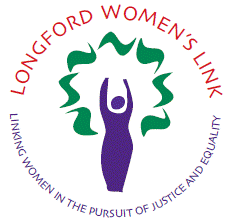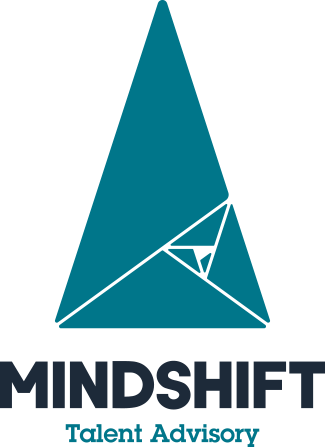



26th August 2023, after Spain won the Women’s World Cup for the first time in history the president of the Spanish Football Federation Louis Rubiales roughly kissed a player on the lips allegedly without consent, for the whole world to see. He firmly grabbed the midfielder Jenni Hermoso by the head with both hands – a move that makes
anyone feel vulnerable, as you cannot escape – and kissing her on the lips.
His initial reaction to those who criticised him was to call them ‘gilipollas’ (arseholes) on live radio and he has played down his actions ever since. The Spain womens’ incredible achievement has been overshadowed by the actions of one 46-year-old man, Luis Rubiales.
The Spanish Football Federation accused Hermoso of lying when she said she didn’t consent to the kiss – threatening legal action against her.
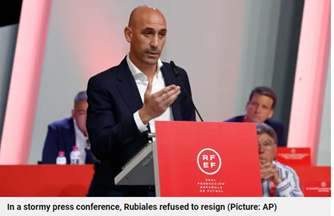
Rubiales reconsidered: 'I will not resign, the kiss to Hermoso was consensual'. “It was a kiss without dominance, as if it were given to my daughter. It was spontaneous, mutual and consensual. As soon as Jenni arrived she picked me up off the ground and it happened.”
Time News, “Death of the Iberian macho: What the Rubiales kiss uproar says about Spain
https://time.news/death-of-the-iberian-macho-what-the-rubiales-kiss-uproar-says-about-spain/
Luis Rubiales has proved that women’s football is a man’s game, https://metro.co.uk/2023/08/28/luis-rubiales-is-proof-powerful-men-will-always-overshadow-womens-achievements-19407342/
On a rudimentary level, our names are the foundations of our identity. From the moment we are born, our names give people the ability to identify us. Everybody is given a name, so why is there a higher regard of respect held for some people and not others? Consistent mispronunciation of someone’s name can be detrimental to their self-esteem and self-worth, as many minorities often feel forced to reduce the true pronunciation of their name to an abridged version for the comfort of their white peers.
This is the example of a arabic woman, working in America.
‘’My name is Yasmine. It has seven letters, two syllables and is relatively cross-cultural and common. However, people still pronounce it incorrectly — even after repeatedly introducing myself in the way I prefer. Derived from Arabic origins, I take pride in the history of my name and my culture. But regardless of my pride and efforts to stay true to my roots, I am defeated.
I constantly am torn between introducing myself lazily as yaz-mean instead of proudly as yes-mean (or, in Arabic, ياسمين).
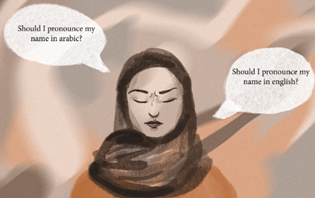
Graphic by Michelle Kim/Daily
It’s a common experience in Arab communities for fathers to have a more white, “American” sounding alias at their jobs, such as Mike instead of Mohammad, or Sam, instead of Osamah. Similarly, there have been countless occasions where my Arab friends have changed their names in settings where they believe it will be mispronounced, such as ordering a drink at a coffee shop, or introducing themselves to new people at social events. These collective experiences are cross-cultural, intergenerational, and persistent in American culture.
Minority groups with “different-sounding” names are forced to change one of the most defining factors of their identity in order to be considered for a job, regardless of their qualifications. This is one of many struggles that some may never bear the burden of.
Yasmine Elkharssa, The Michigan Daily, https://www.michigandaily.com/michigan-in-color/put-some-respect-on-my-name/ , Nov. 2021
Adobe is not just a technology powerhouse – it is a beacon of empowerment for women in the workplace. The company’s unwavering commitment to core values, inclusivity, and respect fosters an environment where women can thrive. These values shape a culture where everyone feels respected and included. Adobe’s Women at Adobe network further strengthens this inclusivity, creating a vibrant community of support.
The company’s approach is not just about words, it is about action. Adobe encourages all employees to pitch ideas and make a meaningful impact, regardless of their gender. Adobe’s robust support for career development and educational reimbursement ensures that women have equal opportunities for success.
Moreover, in a world where work-life balance is paramount, Adobe’s emphasis on well-being is crucial. The company offers extensive benefits, such as flexible work arrangements, extended maternity leave, and support services. Adobe recognises the unique challenges women may face and empowers them to pursue their careers without compromise.
Adobe’s “Adobe for All” mission is a testament to its dedication to creating an inclusive culture where women are treated equally and provided the support they need. Recognised by organisations like Great Place to Work, Adobe’s commitment to empowering women is more than a promise – it is a genuine effort to create an equitable workspace where women are respected, valued, and supported in their career journeys. Adobe is not just a software giant – it is a pioneer in empowering women in the workplace.
https://blog.adobe.com/en/publish/2022/07/22/creating-an-environment-that-empowers-women
At the forefront of ensuring exceptional service for their customers lies Orange Business, where women play a pivotal and integral role. Deneen Goddard is a remarkable female talent at Orange Business and has an inspirational journey for those seeking a career in technology.
With a background in hospitality and technology, she joined Orange with the vision of being part of a dynamic and innovative international IT organisation. Over the past 28 years, she has had the privilege to work with individuals from diverse backgrounds and cultures, cultivating her global business acumen. For Deneen, building strong industry relationships, finding mentors, and staying updated on the latest industry trends where instrumental in her professional growth. She also underlined the significance of self-investment through continuing education and professional development.
However, Deneen acknowledges the enduring stereotype attached to IT and telecom as male-dominated fields. Historically, women were often underestimated in terms of their technical capabilities, contributing to a gender imbalance. Orange’s proactive approach to mitigating these stereotypes is commendable for Deneen, such as training and development programmes, flexible work arrangements for better work-life balance, and initiatives to elevate women into senior positions.
Deneen’s journey at Orange Business serves as an inspiration for those embarking on their careers. Her insights on career development transcend gender boundaries, emphasising the value of mentorship, continuous learning, cross-cultural understanding, and a positive attitude. Orange Business’s commitment to breaking stereotypes and empowering women is a testament to the industry’s evolution. This said, Deneen’s message is clear: envision your path, have confidence, embrace risk, and never let any obstacle hinder your pursuit of success. Orange Business thus stands as a place where women thrive and where stereotypes are challenged.
www.orange-business.com/en/blogs/women-technology-operations-orange-business-their-testimonials
In the federal state of Brandenburg (Germany), there is a nationwide network of agencies that are commissioned by the Integration Office to act as single points of contact for employers in the subject of Inclusion. This contact points have the task
to address employers and make them aware of the training, recruitment and employment of severely disabled people, to be available to employers as independent guides for questions regarding the training, recruitment, vocational guidance and job security of severely disabled people, and to support employers in submitting applications to the relevant service providers.
One of these single contact point is IHK-Projektgesellschaft (IHKPG). IHKPG is committed to ensuring that regional companies receive a comprehensive range of advice on the topic of "inclusion". Companies are supported and accompanied in matters relating to the training and employment of people with disabilities or special needs.
The potentials of disabled people in the company are illustrated:
IHKPG support people with special needs in tapping into untapped labour market resources as well as in training and employing people with disabilities through individual counselling services.
Single contact points for employers on the subject of inclusion
Inclusion Advisor
https://www.ihk-projekt.de/inklusionsberatung/
The inclusion of gender identity in the latest UK census marks a significant step towards recognizing and representing the country's diverse LGBTQIA+ population. The Office for National Statistics, equivalent to Italy's Istat, introduced a specific question about gender identity for the first time in the history of English statistics. The question asked respondents if their gender identity differed from their assigned sex at birth and what terminology they used to describe it.
The UK introduced a gender identity question alongside an existing question on sexual orientation, making it one of the two countries worldwide, along with Canada, collecting gender identity data. New Zealand will also adopt this approach in its 2023 census.
A significant number of participants, approximately 7.5% for sexual orientation and 6% for gender identity, chose not to answer these questions. Over one million people in England and Wales, among a population of around 60 million, identify as lesbian, gay, or bisexual, and 165,000 categorized their sexual orientation as "other," using terms like pansexual, asexual, and queer.
Regarding gender identity, 262,000 respondents (0.5%) indicated a different gender identity from their assigned sex at birth. Among those specifying their gender identity, 0.24% identified as transgender men, a similar percentage as transgender women, and 0.06% as non-binary, transcending the male/female binary.
London had the highest statistical incidence of transgender individuals, in line with urban areas being more accepting of diverse gender and sexual identities. It's worth noting that participation in the gender identity question was voluntary and open to individuals aged 16 and older. Participants in this age group could respond to questions about sexual orientation and gender identity in a separate, anonymous module, ensuring privacy within their families if desired.
The UK's decision to include gender identity in the census is a significant step towards statistical visibility for the LGBTQIA+ population in the country and could serve as a model for statistical offices in other countries.
https://www.ons.gov.uk/peoplepopulationandcommunity
L'Oréal is a company deeply committed to promoting inclusion and diversity in the workplace, with a particular focus on gender diversity. As part of this initiative, L'Oréal has launched the "L'Oréal For the Future - Gender Balance" program. In this article, we will examine this program in detail, when it was adopted, and how it significantly contributes to gender inclusion within the company.
This program represents a core element of L'Oréal's commitment to fostering an inclusive work environment. Its primary goal is to reduce the gender gap and ensure equal representation of men and women at all levels of the company, creating an environment where gender differences are valued and respected. The program includes a set of targeted policies and initiatives designed to ensure that women have the same opportunities for professional growth and development within L'Oréal. This involves implementing awareness measures, training, and empowering female leadership, making a tangible contribution to gender inclusion.
The "L'Oréal For the Future - Gender Balance" program is a clear and concrete demonstration of L'Oréal's commitment to facilitating gender inclusion in the workplace. This initiative aims to create a work environment where both men and women are encouraged to contribute equally, promoting diversity and gender equality within the company. L'Oréal stands as an example of how companies can actively engage in creating an inclusive and gender-respectful work environment.
https://www.loreal.com/en/commitments-and-responsibilities
In 2022 at the University of Pisa, already a promoter of services and activities aimed at inclusion (such as the alias career or the display of a rainbow flag in front of the rectory), the first 'genderless' bathrooms were inaugurated, gender-neutral toilets marked by a special symbol, which can be used by the entire student and academic community. The symbol chosen to indicate the genderless toilets, 86 in total, located in various locations of the University, is one of those internationally recognised to indicate gender-neutral and is graphically intended to give the idea of fluidity and overcoming gender binarism. These bathrooms serve to provide a space for those who do not identify with a specific gender, for non-binary, transgender people,
"Cultural revolutions begin, very often, with a small gesture. A sign that changes the course of events. The plaque that from today appears on about a hundred of our University's bathrooms falls into this category," said the Rector, Paolo Mancarella. The University stated that it made this choice by listening to the requests already coming from the student community.
The fact that an academic institution takes on board the demands and needs of those who inhabit it is an important step in making the institution feel close to them and consequently in ensuring that students and the community as a whole perceive an inclusive climate. On the other hand, an inclusive climate in terms of gender and sexual orientation benefits both those who identify as a sexual minority and those who do not.
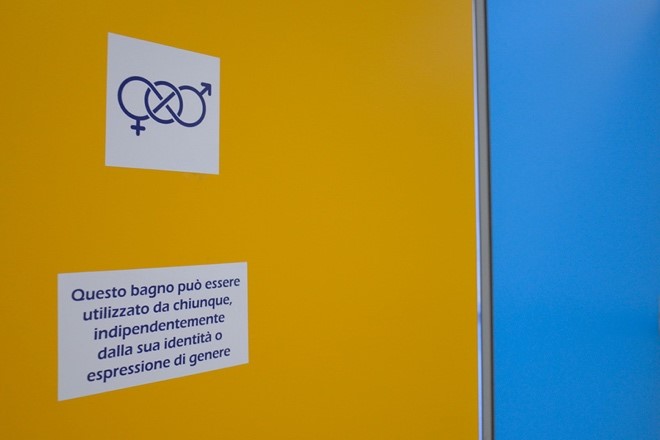
Pictured is the symbol that defines the genderless bathroom and the plaque that reads 'This bathroom may be used by anyone, regardless of gender identity or gender expression'.
Public communication has a strategic role to play in spreading a culture against discrimination and capable of giving value to differences; a culture capable of confronting stereotypes and promoting social, work and cultural models in which to recognise and towards which to strive.
Adopting a gender perspective in communication work helps to put the target audience at the centre and to consider that 'the addressee' is not neutral, it is not Man, but it is people: women and men, old and young, natives and new residents, technicians and citizens, people with different cultural levels. In this way, communication is more targeted and effective.
These are the premises underlying the drafting of the Guidelines for Gender Communication of the Emilia-Romagna Region, which for several years now has been focusing on the promotion of equality between women and men. This document, in particular, published in 2015, is the result of a training course carried out by the 'Interdirectional Integrated Communication Group' in collaboration with the Equal Opportunities Service.
The guidelines are organised in three parts, in synergy with each other:
This clear and comprehensive document is particularly necessary, as we still all too often come across news and communications, through different channels, that convey stereotypes, stigma, discrimination, but also more simply incorrect language: an example of this is the fact that many news items still report 'the transwoman' to indicate a transsexual woman.
Regione Emilia Romagna (2015), Linee guida in ottica di genere. Uno sguardo nuovo nella comunicazione pubblica, Centro Stampa Regione Emilia Romagna, Bologna.
Rosa María Calaf is one of the protagonists of the video 'To me too', in which, together with other women such as Cristina Cifuentes, Eva Amaral, Elena Valenciano, Leticia Dolera and Carmen García de la Cueva, denounce experiences of everyday machismo in workplaces. In the case of the journalist, she tells how she has been questioned about her decision not to have children and recalls the times she has heard her colleagues being judged. "Look, she is here risking her life and her children at home". Gender stereotypes are deeply ingrained cultural beliefs and assumptions about the roles, abilities, and behaviors of men and women.

Source: Freepik
These stereotypes can have a significant impact on the workplace, affecting hiring decisions, promotions, job assignments, and overall career opportunities. Certain professions are still associated with specific genders. For example, nursing or teaching is often seen as women's work, while engineering or IT is perceived as male-dominated. These stereotypes can discourage individuals from pursuing careers that don't align with traditional gender roles.
Fíjate, ella aquí y sus hijos en casa, https://www.youtube.com/watch?v=ScIVGX_JgWk, elDiarioes, 2017
According to data from the Integrated University Information System (SIIU) related to the 2020-2021 academic year, presented in November 2023 by the Minister Joan Subirats, the rector of the Autonomous University of Madrid, Amaya Mendikoetxea, and the doctor in Social Sciences María Ángeles Sallé, who collaborated in the qualitative study, women prefer studies related to care, such as education and health sciences; on the other hand, men represent the vast majority of those enrolled in careers such as engineering, mathematics and computer science. One of the most extreme cases of the gender gap is in nursing, where women represent 82% of the student body. The percentage is still very high in psychology studies (76%) or in careers related to health and social services (72%). In medicine this disparity decreases, although women still represent the majority of students, with 69% of enrolments.
These are some of the results of the report Gender Segregation in University Studies of the Ministry of Universities, which was. Education studies constitute another particularly relevant case of segregation. Sixty-four percent of those enrolled in these degrees are women, although in the case of Early Childhood Education they represent almost all of the students, with 92%. "These figures are unbefitting of the 21st century", denounced the minister, who pointed out that above 60% it is a question of "situations of imbalance".
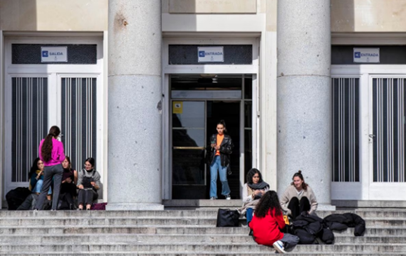
Estudiantes en la Universidad Complutense de Madrid,
CLAUDIO ÁLVAREZ
Mendikoetxea, who is the Equality Delegate of the Conference of Rectors of Spanish Universities (CRUE), pointed to stereotypes that identify women as "protectors of the home" as the main cause of this systematic disparity. "It is curious to see that when women began to enter university a little over a century ago, they did so in those disciplines that were considered appropriate for women's role in the family and in society, such as care and literary studies," explains the rector. "That the picture remains the same is unbecoming of modern times, and is due to the fact that gender stereotypes are so internalised that it seems to be a natural choice for women to choose certain careers.
The gap becomes even wider when it comes to theoretical categories. "If physics is the discipline with the least number of women, in the field of theoretical physics they don't even reach 10%. But it also happens in the humanities. Women study language and literature, but fewer are dedicated to history, and they are hardly counted in philosophy. The perception we have is that everything that requires theoretical thinking is the prerogative of men, who are already recognised as geniuses from childhood," says Mendikoetxea.
Clara Angela Brascia, Enfermería para mujeres, informática para hombres: las carreras universitarias en España no escapan de los estereotipos, El País, 2023 https://elpais.com/educacion/2023-03-27/enfermeria-para-mujeres-informatica-para-hombres-las-carreras-universitarias-en-espana-no-escapan-de-los-estereotipos.html
The Italian Ministry of the Interior's search for 1,381 new police officers has stirred controversy due to eligibility criteria that equate gender identity exploration with "schizophrenia" and "tics." This inclusion in the eligibility requirements has raised concerns and sparked criticism. The Ministry of the Interior's website includes a list of "mental disorders" in its medical eligibility criteria for police recruitment. These disorders encompass conditions like schizophrenia, mood disorders, dissociative disorders, anxiety disorders, somatic symptom disorders, tic disorders, eating disorders, sexual disorders, and gender identity disorders. Notably, these criteria treat the exploration of one's gender identity as if it were a mental illness, equating it with something as minor as a tic.
While the document outlines application procedures, timing, and physical fitness requirements, including exercises like push-ups and high jumps, a deeper look reveals a section titled "Regulation Concerning the Physical, Mental, and Attitudinal Eligibility Requirements for Candidates Applying for Positions in the State Police," which includes a reference to "gender identity disorders". One aspiring police candidate found this reference offensive and degrading. In response, they sought legal assistance and appealed to Minister Luciana Lamorgese and Chief of Police Lamberto Giannini, urging the removal of this condition. The appeal argues that gender identity rights, representing a fundamental freedom, should not be categorized as a mental disorder akin to schizophrenia or other mental health conditions, even if they are in the past. This incident reflects Italy's legal framework lagging behind societal progress in terms of civil rights. While aspiring police officers are discouraged from exploring their gender identity, there are examples of police officers who have transitioned during their careers.
This episode highlights the deeply ingrained gender binary and serves as an example of the need for modernization and inclusivity in eligibility criteria, acknowledging and respecting diverse gender identities in contemporary society.
https://www.lastampa.it/cronaca/
https://www.open.online/2022/07/12/polizia-concorso-disturbi-identita-genere/
A pregnant line cook who experienced extreme nausea and vomiting during her pregnancy and who claimed to have been informed by her female supervisor that she was “pregnant and not disabled” has been granted €16,000 in compensation for her unjust summary termination.
This comes after Lefre de Burgh, an adjudicator for the Workplace Relations Commission (WRC), ordered Millstreet, County Cork-based Easy Meals Ltd, the operator of fast food restaurants, to pay Stacey Barrett €16,000 for her gender-based discriminatory summary termination.
After informing her employer that she was expecting on January 31, 2021, Ms. Barrett was admitted to the hospital the next day due to severe pregnancy-related nausea and vomiting. This can lead to severe problems, such as severe dehydration, vomiting, disorientation, and more. Ms. Barrett was experiencing all of these symptoms, and she occasionally got sick while at work.
Ms. Barrett stated that she did her best to complete her duties when she went back to work and that her employer was aware of the challenges the pregnancy was creating her.
"Vomiting up to 20 times a day, losing weight, and severely dehydrated," Ms. Barrett said during the WRC hearing.
Ms Barrett said that when she attempted to share the difficulties she was experiencing at work, her line manager and firm co-owner Samantha Cleary informed her she was "pregnant and not disabled" and expected her to continue working as usual.
Ms de Burgh noted in her conclusions that Ms Barrett was fired as a direct result of pregnancy-related illness in circumstances where her employer was aware of her pregnancy.
Ms de Burgh judged Ms Barrett's treatment to be "egregious," adding, "I note its foolishness in addition to its unlawfulness."
She also accepted uncontested evidence from Ms Barrett that she was the recipient of inappropriate comments at work by her line manager, Ms Cleary, pertaining to her pregnancy.
Ms de Burgh underlined Ms Barrett's stress about the treatment she received as well as the economic and emotional toll it imposed on her, particularly the consequence of the unlawful discrimination.
Ms de Burgh mentioned Ms Barrett's inability to receive social welfare supports that she may otherwise have had access to.
She went on to say that in employment law, "pregnant women are a particularly protected class of person legally, in recognition of the vulnerability - including economic vulnerability - which pregnancy and its attendant circumstances can bring" .
Ms Barrett said at the hearing that she frequently vomited during her work and claimed that if she missed time due to illness from her midweek shift to 9 p.m., she would be fired.
Ms Barrett's doctor certified her unfit for work on February 18th, and she texted her employer the next day to advise her that she would not be attending work.
Her managers responded by dismissing her by email. "Hi Stacey, unfortunately we have to let you go. You have not been yourself the last few weeks.
“When you are at work it is like that you are not here. Not turning up to work on your days and letting me down and stuck for someone to cover you. I’ve got a business to look after and can’t be left stuck. After our talk nothing had changed. I’m sorry. All the best in your pregnancy, Claudio (Malizia) and Samantha (Cleary).”
There was no appearance at the hearing on behalf of the employer, Easy Meals Ltd. Ms de Burgh, on the other hand, stated that she was satisfied that the employer was given notice of the hearing and was granted €16,000 for discriminatory pregnancy dismissal.
Ms. de Burgh mandated that the company reimburse Ms. Barrett an extra €500 for a different workplace infraction.
https://www.irishexaminer.com/news/munster/arid-41224777.html
In March 2022, at the National Indoor Arena in Dublin, Ireland, during a gymnastics competition, a distressing incident unfolded. It involved the denial of a medal to a young gymnast from a diverse ethnic background, an event that has since gained widespread notoriety. This episode has ignited a passionate debate, highlighting potential workplace discrimination issues.
Over a year later, there remain conflicting narratives surrounding this incident. Gymnastics Ireland extended an apology, citing a complaint of "alleged racist behaviour" from the girl's parents back in March of the same year. They claim that an independent mediation process resulted in a "mutually agreed resolution in August 2023." However, the child's mother vehemently disputes this, asserting that her family never received a genuine apology. According to the Irish Independent, Gymnastics Ireland did not issue a public apology and instead escalated the matter to the Gymnastics Ethics Foundation in Switzerland. The mother voiced concerns about the family becoming targets of racial abuse and insisted that the video be removed from social media. The family firmly believed that their daughter was excluded from the ceremony due to her skin colour, expressing, "We are often the only Black family at gymnastic events, and this incident deeply wounded us." Ultimately, the young athlete received her medal, but only after the ceremony had concluded.
This deeply unsettling event, occurring during the gymnastics competition at the National Indoor Arena in Dublin, Ireland, in March 2022, underscores concerns of racial discrimination within the context of a prestigious sporting event. The response from Gymnastics Ireland, which eventually admitted to an error and issued an apology over a year later, following mediation between the involved parties, leaves a question mark hanging over the issues of workplace discrimination in such a context.
The case of Donna Patterson, a mother of two, has brought to light a distressing episode of direct workplace discrimination. Returning to work after maternity leave, she was asked to fulfill the responsibilities of a full-time job despite her part-time employment contract.
Patterson, employed in Morrisons' online sector, recounted that after announcing her pregnancy, the offer of a new role suddenly "disappeared." During her maternity leave, the company restructured her department, compelling her, upon her return to work, to undertake a full-time role, despite her part-time status. Her attempts to assert her rights through the company's internal channels failed, leading her to resign.
On October 8 2022, the tribunal judge ruled that Patterson had been treated "unfavorably" and that Morrisons had subjected her to "detriment of indirect gender discrimination after maternity leave". Representing herself in the process, Patterson emerged victorious. Morrisons stated its commitment to welcoming mothers back from maternity leave "thoughtfully, consensually, and honorably." However, the company denied any wrongdoing and is considering an appeal.
Patterson's case underscores the need for reforms to prevent workplace discrimination after maternity and offers hope to other women facing similar situations.
https://www.bbc.co.uk/news/business-63457797
According to the latest data from the Spanish National Institute of Statistics, the youth unemployment rate is higher, but if we look at the long-term unemployed, the risk shoots up as we approach old age. More than half of the unemployed over the age of 50 have been looking for work for more than a year and the figures are slightly higher for women. Mercedes is 62 years old, has administrative experience abroad, communication skills and a desire to work. Sixto, 52, can vouch for the success of his career in large companies and entrepreneurial projects with turnover figures. "Thank you very much, but you are not the profile we are looking for", they say that a message systematically bounces back to them when they send an application to the offers published on the internet. Both face the long and painful odyssey of looking for a job when they are over 50 and, in a conversation with RTVE.es, they recognise that they feel "invisible" and "discriminated against".
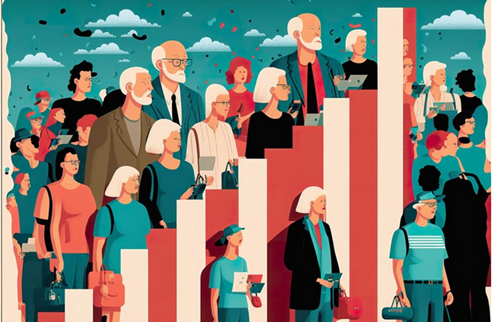
Source: Freepik
It was the gerontologist Robert Butler who coined the term "ageism" in 1975 to describe the exclusion of older people due to a series of stereotypes associated with old age. Such unequal treatment can occur in all facets of life, but is particularly festering when it comes to earning a living.
"I'm going to be left with a retirement that will leave me starving to death", laments Mercedes, who says she is "very worried" about the future of her pension, although for the moment she feels fit enough to work. She has earned some income by cleaning houses, looking after elderly dependents. While organisations dedicated to similar services have not selected her because they consider her too old, she has ended up doing the same work informally. "That's what I'm good at", she says, doomed to depend on "people who don't want to pay social security, who pay in B" and to be "always exposed" to the risk of not being paid.
In the meantime, she has continued to train in a multitude of courses, as recommended by the State Public Employment Service (SEPE) and the Caritas Employment programmes, "with an enormous amount of time, effort and money" in travelling around the Region of Murcia, where she lives. Mercedes, who would like companies in Spain to also value personal experience and not just training, acknowledges that she has got a job because of other discrimination against migrants. "There are many people who only want Spanish people to come to their homes", she laments.
Soler S., Edadismo o cómo cumplir más de 45 años penaliza para encontrar trabajo: "No eres el perfil que buscamos", https://www.rtve.es/noticias/20221121/edadismo-discriminacion-trabajo-mayores/2409334.shtml, RTVE, 2022.
Ana Zabalza is a young graduate in Social Work and Journalism who complains of "indirect discrimination" and of not being able to work in the Government of Navarre because the programme used by the public body is not compatible with extensions for blind people.
Ana suffers from total blindness, which has not prevented her from graduating with two degrees and taking a competitive examination as a Social Worker in health centres in Navarre, "within that 4% that they reserve", although the reality, she complains "is that when we get the job we are excluded".
Ana received a job offer to fill a vacancy for a few weeks at the Milagrosa health centre in the capital of Navarre. Before arriving there, and during the recruitment process, she made her situation known: "I contacted the centre and told them that I am blind, and that I need an extension to be able to access patient records".
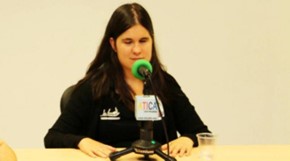
Ana Zabalza Izco, detrás de los micrófonos de Atica FM en 2018.
This extension, JAWS, is a screen checker that allows blind people to read, through an audio system, what appears on the screen "and also the attached documents". The labour department told her that they would take the necessary steps to ensure that everything went smoothly.
When she arrived at the health centre, the colleague she was replacing and whom she thanked for her willingness "stayed an extra day to teach me, tutor me and help me a little at the beginning". She was told that the only equipment compatible with the JAWS extension was a laptop, which they tested the system on, "but it didn't work". The Atenea system, the one used for consulting and managing records, was not compatible.
Ana's situation is protected by Law 1/2013, which establishes the rights of persons with disabilities and their social inclusion, has been in force since 2013. Article 36 of this law states that "equal treatment is understood as the absence of any direct or indirect discrimination on the grounds or because of disability, in employment, vocational training and promotion and working conditions".
From the Department of University, Innovation and Digital Transformation, the Director General of Digital Transformation, Guzmán Garmendia, points out that "there is a small gap to be filled in the future because this is a question of the will of the Government of Navarre and not of legality".
He adds that the Government has "an obligation to make the spaces accessible to the public, both the websites and the mobile apps and other activities that we have for the public", although he insists that "there is no legal regulation that obliges us to ensure that the internal tools of the Government of Navarre are also adapted".
Laura is 28 years old and from Treviso. Her story of discrimination, particularly transphobia, Laura being a trans girl, occurs in the work context. Laura has a job interview, which goes well. So she is called back to present her documents and sign her new work contract. At that point, Laura, who had not yet disclosed her transition path, is forced to talk about it because her documents are not yet corrected with her elective name and gender. Faced with this news, she is told on the phone that she will have to make a further transition. Two hours later, Laura recounts, her recruitment was shelved, on the grounds that her gender affirmation path could create problems.
Laura is 28 years old and has been on a gender transition process since 2021, which has helped her to feel better about herself. In the interview she gave, she says that she had always felt trapped in a body that she did not feel was her own, and that she had always found it difficult to understand and give herself legitimacy. However, during the Covid-19 pandemic, which forced everyone to slow down their daily lives, she had the time to look inside herself in the mirror and understand what she was feeling.
The experience of transphobia in the world of work is not the first for Laura. She had already experienced discrimination at work for being a trans person. This happens on a daily basis to many trans people, especially trans women and those where passing as a woman or a man depending on one's chosen gender is not particularly strong, making the condition of being a trans person manifest and evident, and encroaching on cultural models linked to gender binarism.
D’Este, A. (2022), “Laura, trans discriminata sul lavoro: «Mi avevano quasi assunto, poi hanno scoperto la mia identità»”, in Corriere della Sera, RCS Edizioni Locali srl, Milano.
Francesca works in a company as a salesperson. When she starts this job, before embarking on the transition process, i.e. when she still presents herself as a man, Francesca is considered a good saleswoman and obtains good results and much satisfaction. When he separates from his wife, with whom he had two children, he realises that the path he needs is a transitional one, which he undertakes to become Francesca. In revealing his identity, he initially seems to gain the support of everyone in the company, from colleagues to top management. However, when it is time to renew her contract, Francesca is faced with different treatment than her colleagues, the only one who is not guaranteed a fixed monthly salary. In pointing this out, the employer takes to calling her by her given name and using masculine language, as her documents have not yet been rectified.
Francesca at that point did not accept to remain in an environment where she had suffered blatant transphobic discrimination and started looking for another job, encountering numerous difficulties due to her being a transgender person. With the arrival of the Covid-19 pandemic, the economic difficulties and difficulties in finding work become even greater. For a few months Francesca worked as a prostitute. In the interview Francesca says that 'psychologically it was a devastating experience. When I was on the street I cried all the time. I received so many humiliations from the men who drove by and I took so many, too many risks'.
Prostitution is a stereotype still strongly associated with transsexuality. It happens because historically the lack of access of transsexual women to the world of work led them in many cases to prostitution. Unfortunately, this history tells us that it still happens today. What is certainly missing and makes people belonging to a sexual minority feel poorly protected are laws regulating the possibility or impossibility of discrimination on the basis of gender and sexual orientation.
Pallara, P. (2021), “«Io, trans discriminata sul lavoro e costretta a prostituirmi»”, in Collettiva.it, Futura Srl, Roma.
In Germany, every person is free to live out their sexual/gender identity, and the law protects lesbian, gay, bisexual, transgender, transsexual, queer and asexual individuals, i.e. the LGBTQIA+ community. Nevertheless, LGBTQIA+ persons still face hostility and discrimination from some people in the society. Find out more about your rights and how to fight discrimination.
Advice and support:
There are many counselling centres for the LGBTQIA+ community in Germany. They can help you with all sorts of questions in the areas of love, sex, illness, discrimination, coming out, and alike. You can find a counselling centre in your area, e.g. on the website of VLSP. You can also receive counselling from GLADT e.V. in German, English, Turkish, Farsi, and Kurdish (Sorani) by calling 0152-11859839 or by sending an email to info@gladt.de. It is also possible to arrange for counselling in other languages. As an LGBTQIA+ refugee, you can also find specialised counselling services at queer-refugees.de.
If you are under 27 years old, you can also reach out to the staff of comingout.de. They speak German and English and could be reached at 030-67122671 or help@comingout.de.
You can also become a member of the Lesbian and Gay Association (LSVD), which is committed to the rights of the LGBTQIA+ community in Germany.
Handbook Germany LGBTQIA+
https://handbookgermany.de/en/lgbtiq
Employees in Ireland will soon have a statutory right to five days of paid domestic abuse leave in any 12-month period at their full rate of pay. The details are as follows:
To ensure that the leave is available to individuals who need it, the 2023 Act does not offer any grounds for a company to decline an employee's request to take the leave. Furthermore, no proof of domestic violence can be requested by an employer, and there is no service requirement. Employees must notify their employer 'as soon as practically practicable' after taking domestic violence leave that they have taken it.
The employee is first informed by her 'boss' that her colleagues/colleagues do not appreciate her as a professional. She then finds that the reports she has prepared are not read or that specious remarks are made. By order of the 'boss' she has to report her work to a colleague who then reports back to him. At his behest, two colleagues start to reread/review what he does and report the error to him, who in turn asks the employee why the errors and oversights occurred. The start of work is brought forward to 7 a.m. and it is very complicated for the employee to leave her daughter at 6 a.m. but she confirms her availability to avoid problems. Contact with the boss, on the other hand, continues to take place purely via e-mail and with telegraphic instructions. Colleagues in the area barely speak to her and when she calls they do not answer the phone and do not call back. Others only speak to her when they are alone with her, apologising if they cannot be friendlier in the presence of others. After weeks of heavy discomfort one afternoon the worker felt ill. Sudden tachycardia, trembling, lack of air. She asked for a day off to take her daughter to a specialist visit that had been booked and waited for months and was of crucial importance for her health, but her request was first ignored and then refused. The answer throws her into a total state of anxiety and she has to be taken to the emergency room with a diagnosis of reactive anxiety. Illnesses take over and she no longer has the strength to go to the office and the specialist doctor orders her to rest and treatment. The company sends six tax visits and all the doctors confirm the worker's state of prostration. Now the woman is no longer able to continue, she needs to work, but she does not believe she will return to the company.
https://www.voltoweb.it/risorsamobbing/2017/10/31/tre-storie-di-ordinario-mobbing/
Regulations for Service Providers
With the recent adoption of the Act to Improve Enforcement of the Law in Social Networks, Germany has introduced compliance obligations for social networks. In particular, social networks are required to remove content that is unlawful under certain provisions of the German Criminal Code within a specific time frame after having been notified about the content. This obligation exists with regard to content fulfilling incitement to hatred, threatening the commission of a felony, insult, defamation and violation of intimate privacy by taking photographs of the Criminal Code. In connection with this, the act also provides for the possibility to fine social networks up to 50 million Euros for demonstrated systemic shortcomings with fulfilling the compliance obligations. The act therefore, contributes to a healthier environment in social networks and thus helps to contain cyberbullying and cyberviolence. The act shall enter into force on October 1st 2017.
The act also amends section 14 para. 3 to 5 of the German Telemedia Act (Telemediengesetz) and provides host providers (such as social networks) with the permission from a data protection perspective to disclose personal data (data relevant for establishing the contractual relationship between user and service provider and usage data) to individuals for the purposes of enforcing civil law claims related to the content mentioned above. The legal grounds for these disclosure requests by individuals, however, are to be found in other relevant legislation, in particular, the German Civil Code.
Cyberharassment, violations of privacy, cybercrime, actual violence -Germany-
https://www.coe.int/en/web/cyberviolence/germany
Cyber Bulling and Cyber Stalking: Help for Victims Germany
World Wide Inititiatives, policies, strategies
https://www.coe.int/en/web/cyberviolence/initiatives-policies-strategies
Journalist Samira Ahmed sues the BBC for 'sex discrimination' and wins. The British presenter took to the courts claiming that her pay for hosting 'Newswatch' should have been equal to that of her colleague Jeremy Vine, who presents 'Points of View'. "I do the same job as my colleague and get paid six times less. I just ask why the BBC thinks I'm only worth a sixth of the value of a man's work to do a very similar programme." Ahmed is paid £465 for each episode of his programme, while his colleague Vine received three thousand. The BBC argued in its defence that their work 'was incomparable' and that Vine's show 'was "extremely well-known" compared to Ahmed's "relatively niche" programme'. The justification, however, did not convince the London Central Employment Tribunal, which ruled in favour of the journalist: 'The BBC,' it ruled, 'failed to prove that the difference in pay was due to a material factor and failed to rebut the presumption of sex discrimination'. A three-judge panel ruled that the programmes were equivalent and, more importantly, that the minimal differences 'have no impact on the work performed by the two presenters, nor on the skills and experience required to present the programmes'. After the ruling, Ahmed said "that she was looking forward to continuing to do her job, which is "to report stories and not to be 'the story'" adding that "nobody wants to act against their employer. I love working for the BBC. And I'm glad the whole thing has been resolved'.
Corporate welfare is the set of monetary and non-monetary benefits that a company offers its employees in order to improve their living conditions, in a broad sense. Corporate welfare includes CSR, work life balance, work-family balance and CFR policies. Amyko was founded in October 2013 and has been on the market with its Personal Health IT Applications products since December 2015 and works on projects. For the company of 22 employees + external collaborators, each person who brings added value is part of the project and collaborates in a team where the focus is on sharing skills for the good of the project itself. This harmony leads each employee to feel an active part in a process of growth that depends on the extent of each person's commitment (whether founder, investor or storekeeper). founder, investor or warehouseman). The welfare and reconciliation policies implemented include smart working, welfare (on which discussions are currently underway to find insurance solutions that protect the worker during the working period and also at the end) and training even at the end) and training (employees, at least once a month at least once a month, participate in training courses specific to their field, which make them grow personally first and then at company level). The results mainly relate to work autonomy, which is also fostered by the implementation of smart working for the more than 20 employees. Work autonomy is a stimulus to productivity and brings an added value that exceeds that of 'stationary' work, with an equally positive counterpart for the company in terms of flexibility of fixed costs.
Good practices di conciliazione lavoro famiglia e welfare aziendale. Uno sguardo alle PMI. A cura di Gianpaolo Tomaselli, Ph.D. Università degli Studi “Magna Græcia” di Catanzaro. © Fondazione Marco Vigorelli Via Morozzo della Rocca, 3 20123 Milano
Unilever, a multinational consumer goods giant with a substantial European footprint, is leading the way in promoting gender diversity within its organisation.
One of the company’s standout initiatives is the “Unstereotype” campaign. Unilever recognises the significant influence advertising has on societal norms and strives to eliminate gender stereotypes from its advertising efforts. By pushing for a more balanced and inclusive representation of women in marketing and media, Unilever is taking steps to break down harmful stereotypes that have persisted for too long.
Unilever goes beyond just addressing stereotypes by actively nurturing female talent within its ranks. The “Women in Leadership” programme is a testament to the company’s commitment to support women’s professional growth. Through mentorship, targeted training, and clear pathways for career development, Unilever aims to create an environment where women can thrive and reach leadership positions. This programme reflects the company’s proactive approach to fostering diversity at all levels of the organisation.
Moreover, Unilever’s dedication to gender diversity is also a quantifiable commitment. The company has set ambitious targets to ensure that women are well-represented in leadership roles. This demonstrates Unilever’s intent not only to eliminate stereotypes, but also to bring about meaningful change within the organisation. By setting clear objectives, they send a powerful message about the importance of gender diversity in the workplace. Additionally, Unilever’s Women Diversity Initiative serves as a shining example of a multinational corporation actively working to create a more inclusive and equal environment for women.
By tackling gender stereotypes and empowering women through leadership development, Unilever is setting a standard for gender diversity management that can inspire other companies to follow.
Vodafone, a prominent telecommunications company with a strong European presence, stands as a beacon for LGBTQ+ diversity and inclusion. The company’s unwavering support for LGBTQ+ employees and customers are exemplified through the Vodafone LGBT+ Friends Network, that serves as a vital platform for LGBTQ+ employees and their allies to connect, share experiences, and actively promote inclusion in the workplace.
One of their employees, Marta Lima, has been nominated as 2023’s Outstanding Top 100 LGBT+ Future Leaders Role Model List. Marta, who goes by she/her pronouns, is a vital presence within the LGBT+ Friends Network at Vodafone. As a keynote speaker in numerous global webinars, Marta has discussed a wide range of topics, from LGBTQ+ rights and hate crime to the essential role leaders play in fostering inclusivity. She passionately advocates for the significance of coming out at work and emphasises the power of allyship.
Marta’s contributions extend beyond her corporate involvement. She recently unveiled Zoteria, a groundbreaking mobile app designed to fight the issue of LGBTQ+ hate crime. This app empowers individuals to report incidents and access support from multiple charitable organisations, signifying her commitment to creating safer spaces for the LGBTQ+ community, an app that has been sponsored by Vodafone.
Vodafone’s commitment extends further as the company actively participates in LGBTQ+ pride events and vigorously advocates for LGBTQ+ rights on a global scale. Their dedications transcend employee support, as they tirelessly work towards creating a world where LGBTQ+ individuals feel genuinely included, respected, and celebrated.
https://careers.vodafone.com/uk/whats-in-it-for-you/diversity-and-inclusion/lgbt/
PWC, the multinational professional services firm, has earned a distinguished reputation for its unwavering commitment to diversity and inclusion. One of the cornerstones of this commitment is the provision of extensive gender equality training to its employees. PWC’s approach to this training is comprehensive, addressing critical issues surrounding gender bias, inclusive leadership, and fostering a more equitable workplace culture.
PWC’s gender equality training initiatives extend beyond mere education, encompassing various engagement methods. The company hosts workshops, webinars, and awareness campaigns that serve as impactful platforms for driving home the significance of gender equality. These sessions are not just about imparting knowledge but also about equipping employees with the tools and skills required to confront and challenge bias, thereby actively contributing to a more inclusive work environment.
Moreover, PWC’s dedication is not confined to internal initiatives alone, as the company extends its impact by actively participating in research and thought leadership endeavors focused on gender diversity. This proactive stance contributes significantly to the broader conversation on gender equality in the workplace, reinforcing PWC’s role as a leader in fostering inclusive practices.
www.hrdive.com/news/pwc-un-team-up-to-create-unconscious-biases-course/428517/
Siemens, the global technology leader, stands at the forefront of fostering gender equality within its organisation. The company has adopted a multifaceted approach to promote inclusivity and diversity, with comprehensive gender equality training programmes at its core, initiatives that are designed to educate employees and cultivate an inclusive workspace culture.
Siemens’ equality training goes beyond the surface by delving into essential topics, such as unconscious bias and gender stereotypes. By addressing these issues head-on, Siemens seeks to challenge preconceived notions and create a workspace that values individual contributions without regard to gender.
This commitment to diversity and inclusion is further underscored through leadership development programmes, tailor-made to empower women in leadership roles. These programmes equip women with the skills and confidence necessary to advance their careers, thus closing the gender gap within the organisation. According to Stefanus Audrey Winawan, Supplier Quality Manager: “Siemens believes in supporting gender diversity and make it a part of our corporate identity through programmes such as Women’s Talent Networks, Women’s Leadership Program, various mentoring, and coaching initiatives, as well as technical training and development programmes. We engage in continual dialogue so we can understand each other’s perceptions and experiences. We want every individual’s voice to be heard”.
Siemens’ proactive approach to gender equality training reflects a strong dedication to creating a more equitable workspace. By equipping its employees with the knowledge and tools to combat bias, Siemens not only champions gender equality, but also paves the way for a culture of inclusivity that benefits the entire organisation.


